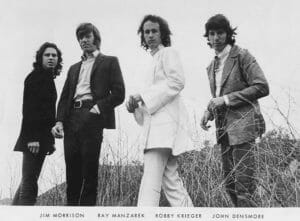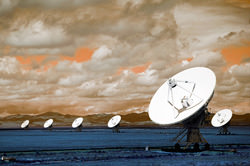The Doors Unhinged and Jim Morrison’s Legacy
We were seduced by the allure of corporate money and Jim wanted to smash a Buick to smithereens. Image: Adobe
Image: Adobe
The following is an adapted excerpt from The Doors Unhinged: Jim Morrison’s Legacy Goes on Trial by John Densmore, which will be published November 7th, 2023 by Akashic Books.
“Fuck you!” Jim Morrison yelled.
His outburst shocked the rest of us. It was 1968, we were on a break from rehearsing, and Jim had never raised his voice at us like that before.
“Fuck you guys!” he repeated. “I thought it was supposed to be all for one and one for all. I thought we were supposed to be brothers!”
“Jim, we are, man!” Ray responded meekly. “Nothing has changed.”
“Everything has fucking changed, Ray!” Jim said. “Everything!”
“Why?” Ray asked. “I don’t understand. Just because we signed a contract to get a load of money for a fucking song in a Buick commercial . . . why has everything changed?”
Jim spoke from a deeply wounded place, pulling a knife out that he felt we had stabbed into the band’s unspoken mission statement:
A band of musicians (warriors) who used musical notes instead of arrows, and always aimed for the listener’s heart.
In Ray’s autobiography, he described this next comment as Jim stabbing The Doors in our collective heart:
“Because I can’t trust you anymore,” Jim snapped. “It’s fucking industry! It’s corporate! It’s the devil, you asshole. We always agreed that our music would never be used in commercials. You guys just made a pact with the devil.”
Robby got defensive: “The hell we did.”
“Oh yes you did, Robby. He shows you what you want and then he puts a little twist in it. Makes you say yes to him when you know you shouldn’t . . .” Jim was pacing. “But you go along with it because the deal’s just too good. It tastes too good.” He stopped and stared at our keyboard player. “It’s too much money, isn’t it, Ray?”
Ray’s fur arched up along his back. “Fuck you, Jim.”
“I know you, Ray,” Jim said. “You’re only in it for the money.”
Ray retaliated: “I just wanna make music. And if we can make some money at it . . . that’s cool with me.”
Ray was trying to smooth things over, but his feeble attempt at “fathering” was failing. In his book, he described Jim during this period as “over the top, gone,” while he described himself as “trying to maintain the dream” ($?), hoping Jim would snap out of this phase he was in. Hoping that it was a phase. A momentary aberration. Hoping that Jim would come to his senses and we could resume our grail quest together (for more $?). The four of us. The Doors.
“Lots of money,” Jim mumbled loud enough so we all could hear.
“What’d you say?” Ray responded.
“You heard me.”
Robby tried breaking the tension: “Well, it’s too late.”
“Oh yeah? We’ll see about that.” Jim upped the ante: “I’m gonna smash a fucking Buick to dust onstage. It’s gonna be part of my new act. ‘Smash a Buick to Smithereens.’ We’ll see how they like that. And then I’m gonna get Abe [our attorney] to sue their asses. For big fucking bucks, Ray. For a lot more than their shitty little contract. Then let’s see if they still want to use a Doors song to sell a sports car.”
Jim grabbed the phone on the spot and called our lawyers. “Threaten them with a lawsuit!” he bellowed into the receiver. “Tell them I’m gonna smash a Buick with a sledgehammer onstage! Tell them anything! But stop the fucking contract!”
That was Jimbo talking—Jim’s tortured alter ego who had become an alcoholic.
This prompted a series of short legal agreements in response to the contract we had approved for “Light My Fire” to be used in a commercial . . . without Jim’s consent. We got out of that contract, but it turned out that Jim’s angry words to Ray—You’re only in it for the money—were harbingers of things to come, things that thirty years later would cause The Doors to unhinge.
Jim’s trust for us had eroded, although we continued to make great music. Then he left for Paris, where he died. Today, no longer are we “one for all,” no longer brothers. Instead, here we are, about to go to court, fighting tooth and nail over the integrity of our name and our music. This time, Jim may not be here to rage against the pursuit of money at the expense of artistic integrity, but his spirit is here, urging me on to “smash that Buick.” Well, this time it’s Cadillac offering us the big bucks, and a tour without me or Jim that Ray and Robby want to call The Doors of the 21st Century. The Doors, my ass.
Yes, without the spirit of Jim Morrison (the hinges), The Doors don’t open. And what was that spirit? In my opinion, it was a spirit infused with creativity, a spirit incompatible with compromise—a pure strand of new ideas, unpolluted by circumstance. It’s hard to live in this world with that kind of integrity.
A few years before Jim’s death, when he commented on the passing of Jimi Hendrix and Janis Joplin, I think he was commenting on himself as well, although maybe he wasn’t conscious of it. My intuition tells me that toward the end of his life Jim had entered a state of ennui, a world-weariness manifested in a deep sadness and lack of energy, and thus his comments about Hendrix and Joplin were also comments about himself. In reflecting on Janis and Jimi, he jokingly said, “You’re drinkin’ with number three!”
That was Jimbo talking—Jim’s tortured alter ego who had become an alcoholic. The younger Jim, vibrant as any twenty-year-old could be, had been determined to say something with his words and determined not to let the message become diluted. So determined that when we, his self-proclaimed brothers, in the vehicle for his words (The Doors), suggested compromising a song that Robby had mostly written by selling it to advertise a product (“Come on, Buick, Light My Fire”), Jim went ballistic. When that happened, the pure trust among us, the shepherds of The Doors catalog, was never to be the same.
Later, when huge success had befallen us four lads from Venice, California, there was no time for the original gestation period of a song. Our fans were demanding the newborn “Light My Fire,” along with the rest of the songs on our first LP, every night. Gone was the time for the womb-like incubation in the garage that we liked giving to each song. That was when Jim suggested moving to an island and starting all over. He alluded to that idea in our song “Strange Days,” saying that our old way of making music was being destroyed and we should find a new town. He was trying to get back, to renew that elusive quality that was with us in the rock and roll garage many years before.
I always knew that the lyrics to “Hello, I Love You” were great, all the way back in the garage when we first started. Incidentally, this song was not about Ray’s girlfriend, as he falsely reported in his memoir. The very provocative line about Jim seeing an extremely attractive Black woman on the boardwalk killed me:
Sidewalk crouches at her feet,
(“Hello, I Love You”)
Like a dog that begs for something sweet
Do you hope to make her see, you fool?
Do you hope to pluck this dusky jewel?
The lyrics were powerful from the start, but the truth is that we’d been struggling with the musical arrangement for years when our producer, Paul Rothchild, finally said, “Damn it, we need a hit, and this one could fit the bill. Let’s write the music in the studio.”
NONE OF THIS, can ever take away from the magnificence of the muse that visited us four guys in a garage in Venice, infused by Jim’s voracious spirit.
Paul was correct that we should make an attempt, even though it would have been cheaper to do it in rehearsal, but that intimate, personal time together to incubate a song had been long gone, ever since the huge success of “Light My Fire.” Fans demanded to hear the hits, and the organic method of adding a leaf here and a leaf there to the nest of a new song was now in overdrive. Our group started to feel like a runaway train, with Jim as the locomotive in the front, Ray shoveling coal into the engine, Robby on the fence in the middle, and I was the caboose (drummers are in the back), trying to avoid an accident by putting the brakes on.
When Jim sang us “Crystal Ship” back in the garage, that song formed immediately as we figured out the chords and rhythm in a few hours. But “Hello, I Love You,” even with its tantalizing words, simply wouldn’t go to bed.
She’s walking down the street
Blind to every eye she meets
Do you think you’ll be the guy
To make the queen of the angels sigh?
Robby and Rothchild overdubbed so many distorted guitars, it sounded like a snake with a buzzer for a rattle. But as the snake wound its way to #1, I was amazed that we pulled it off. It was too poppy a sound for my taste, but as usual, I couldn’t get enough of Jim’s fabulous lyrics!
A true artist Jim was . . . but by the time he made his way to Paris, he was also a man with a disease. A disease so strong that his pals (Ray, Robby, and me) couldn’t hang with him anymore like in the old days. We really didn’t want to go to that island with him . . . There was trouble in paradise. There were rummies. Plus, we were a little intoxicated ourselves . . . with fame.
Suckcess (as Bob Dylan spells it) has a dark side. We were seduced by the limelight and Jim was addicted to the juice. God knows how many folks try everything possible to keep it together. But no one—myself included—seems to escape the dark underpinnings of the human condition . . . intoxication, greed, grabs for power. As Jim’s pals, we wanted more success . . . and Jim wanted less, but more of the drink, since the sticky web of liquor had already been woven tightly around him.
But none of this, NONE OF THIS, can ever take away from the magnificence of the muse that visited us four guys in a garage in Venice, infused by Jim’s voracious spirit, which, when denied, he substituted with the spirit in the bottle. So this story is a tragedy.
When I look back, I wonder, how does such a magical union go sour? Why do good people get divorced? These questions can’t be fully answered, but I’m going to do my best by telling the story from my viewpoint . . . from the drum stool. Maybe it’s the alignment of the stars . . . maybe it’s just fate.
Your support matters…We asked for signs
—Leonard Cohen
The signs were sent:
The birth betrayed
The marriage spent
Yeah the widowhood
Of every government . . .
Ring the bells that still can ring
Forget your perfect offering
There is a crack, a crack in everything
That’s how the light gets in.
Independent journalism is under threat and overshadowed by heavily funded mainstream media.
You can help level the playing field. Become a member.
Your tax-deductible contribution keeps us digging beneath the headlines to give you thought-provoking, investigative reporting and analysis that unearths what's really happening- without compromise.
Give today to support our courageous, independent journalists.






You need to be a supporter to comment.
There are currently no responses to this article.
Be the first to respond.